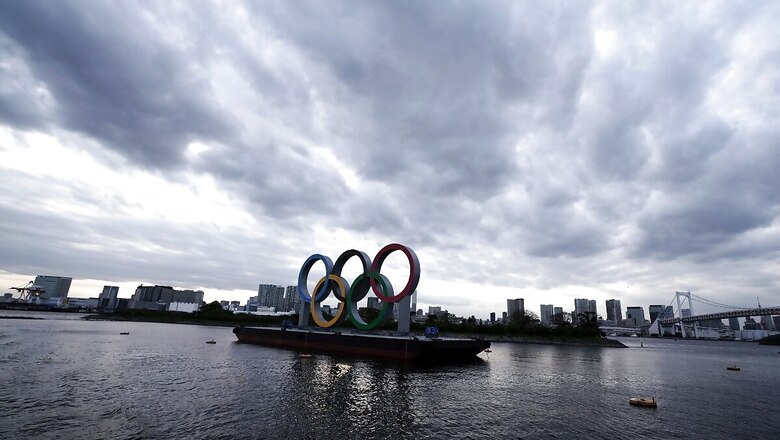
views
Tokyo Olympics, slated for July 28 to August 8, is less than three months away but the uncertainty around the mega event is only growing given the intensity of the second wave and the current situation of Japan. Tokyo 2020 was postponed last year due to coronavirus but ahead of the postponed event this year, the International Olympic Committee (IOC) and Japan’s organisation committee has made it clear that if the Olympics can’t go ahead, it will stand cancelled and there will be no further postponement. That makes the situation very tricky for the Japanese authorities, who are determined to hold the Olympics after the amount they have already spent.
Olympics every four years is like a festival. Sure thing that it won’t be the same this year with overseas spectators not allowed but it is also very much likely that it can be a closed event with only the organisers, athletes, coaches and support staff. Surely, that will take the shean out of the Olympics but given the current situation, it may not be unwise.
Apart from that, most Japan residents are in favour of either postponing the Olympics or just cancelling it. According to a Kyodo news poll on the same, 39.2 per cent of the population between the event should be cancelled, 32.8 per cent were in favour of postponement while 24.5 per cent thought it should go ahead as scheduled.
While Japan was able to contain the virus better than most countries in the world, the last two months have been problematic with more and more cases being reported. On Thursday, Japan reported 591 new cases in Tokyo and a weekly average of 737 with the country currently in emergency situation. On top of that, the government has extended the emergency till May 31.
WORRYING LACK OF VACCINE URGENCY
Despite all the measures from Japan to contain coronavirus in the country, they have shown a worrying lack of urgency to vaccinate its people. Only two per cent of Japanese residents have received a shot of vaccine with a total of 34, 89, 719 doses administered. In every 100 people, only 2.8 people have been vaccinated.
COVID CASES DURING TORCH RELAY
During the Olympics Torch Relay, eight people have so far been reported to have been infected. In April, two of those cases came to light while six of those have been reported in May.
Owing to the current situation, the Olympics made a request for 500 nurses to help with the medical set-up for the event but that is not something people or the medics are happy with it. The medical industry is already stretched as they treat Covid-19 patients and the country in state of emergency, the demand is being called “insensitive”.
“Beyond feeling anger, I was stunned at the insensitivity,” Mikito Ikeda, a nurse in Nagoya in central Japan, told the Associated Press. “It shows how human life is being taken lightly.”
In a statement from the Japan Federation of Medical Workers’ Unions, secretary general Susumu Morita said the focus should be on the pandemic, not the Olympics.
“We must definitely stop the proposal to send as Olympic volunteers those nurses, tasked with protecting the fight against the serious coronavirus pandemic,” Morita said. “I am extremely infuriated by the insistence of pursuing the Olympics despite the risk to patients’ and nurses’ health and lives.”
MEASURES IN PLACE
Overseas fans have already been barred from attending the Olympics in order to protect the local population from the virus. Apart from that, there is going to be restricted access for athletes, coaches, journalists and event officials. Before entry into Japan, several Covid tests are mandatory while athletes will be tested every day during the Games. Non-athletes attending the Olympics, like coaches and officials, will not be having much contact with Japanese public.
Rowers are currently in Tokyo for the Asia-Oceania Olympic and Paralympic Qualification Regatta and here is how South China Morning Post traced the Hong Kong rowers:
On arrival at the Narita Airport on May 1 with full RT-PCR tests within 72 hours, passengers were separated into high-risk and non high-risk countries. They were then taken to a station where their Covid-19 tests certificates were checked and approved. Thereafter, they were asked to install tracking apps on their phones for the local authorities to trace their movement.
Then the passengers undergo another Covid-19 test – a rapid one. They are then made to wait for their results and negative results’ are given a coloured card and asked to proceed for immigration. While it took about two and half hours for the Hong Kong team to undergo this process, for high-risk countries like India, it took them around five hours.
They are then transported to their hotels in special buses and each athlete gets a separate room and allowed to leave only for meals and to go to the competition venue.
Meals times are staggered with only four to five out of 19 teams in meal area at a given time. On top of that, same team members while sitting on the same table are separated by partitions and none can interact with athletes of other countries.
“It’s a bit like a prison, it’s not a lot of fun, obviously,” said Hong Kong head rowing coach Chris Perry. “It’s a little bit miserable, even in the hotel the coaches and physio cannot go to the athletes’ rooms and they cannot see us, so we can’t interact with our own team. But I have to give the organisers a lot of credit. The standards are very high and they have been incredibly kind and polite as you would expect from a visit to Japan. They have done their best. Of course, there is a lot of rigidity and very little flexibility in doing things, but I think everyone has kind of settled down with that now.”
Read all the Latest News, Breaking News and Coronavirus News here. Follow us on Facebook, Twitter and Telegram.

















Comments
0 comment